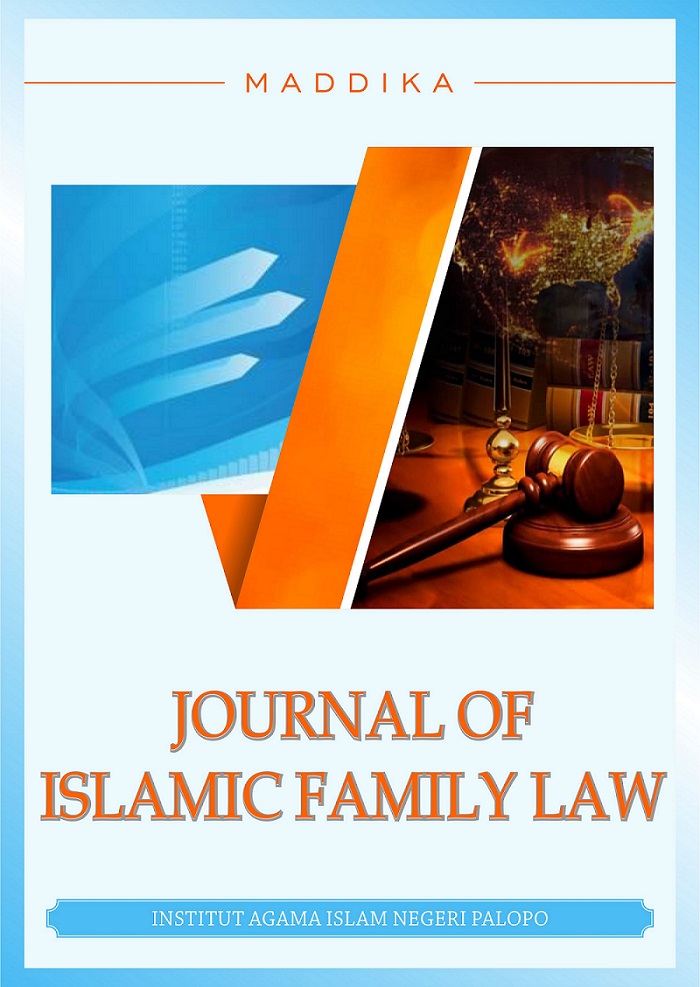HUKUM WARIS ISLAM DAN PLURALISME HUKUM
DOI:
https://doi.org/10.24256/maddika.v4i1.4861Keywords:
Islam, inheritance, law, pluralismAbstract
Islamic Inheritance Law is a law that regulates the inheritance of the property of someone who has died given to the rightful, such as family and community who are more entitled or can be interpreted as a law that regulates the transfer of something from someone to someone else in the form of property and knowledge and honor. The provisions that have been outlined by Allah swt are listed in the Qur'an including Surah An-Nisa verse 7, 11, 12 with the existence of this inheritance law coupled with rules explaining the implementation of the Rasullah SAW, then all aspects of its implementation have legal rules. A person who is Muslim is strongly encouraged to divide the inheritance in accordance with what has been revealed in the Qur'an and guided by the Prophet in the hadith. The pluralism of inheritance law in Indonesia was influenced by the receptie theory during the Dutch era. Where until now inheritance law is still pluralistic, there are at least three legal systems that live and develop and are recognized, namely the Customary Law system, the Islamic Law system and the Western Law system. The significant difference that can be seen is that in the system of property distribution in customary law, it can be done before the owner of the property dies. Meanwhile, Islamic law and civil law require death in terms of the division of inheritance.
References
Abdullah, Ahmad Zawawi. “Pengurusan Harta Pusaka Dalam Islam - Ilmu Faraid.†Pustaka Ilmuwan, 2016.
Abdullah, Mulyana. “Memahami Prinsip-Prinsip Pembagian Harta Peninggalan Dalam Perspektif Dakwah Islam.†Ahsan: Jurnal Dakwah Dan Komunikasi, 2022.
Amina, Siti. “Hukum Kewarisan Islam.†Nusantara Journal of Islamic Studies, 2021. https://doi.org/10.54471/njis.2021.2.2.80-90.
Ash-Shabuni, Muhammad Ali. “Pembagian Waris Menurut Islam.†Gema Insani Press, 1995.
Deki Suwarna, Sabri. “Fiqh Mawaris (Syariat Kewarisan) Di Indonesia.†Jurnal Syariah Hukum Islam, 2018.
Fikri & Wahidin, Fikri & Wahidin. “KONSEPSI HUKUM WARIS ISLAM DAN HUKUM WARIS ADAT (Analisis Kontekstualisasi Dalam Masyarakat Bugis).†Al-Ahkam: Jurnal Ilmu Syari’ah Dan Hukum, 2017. https://doi.org/10.22515/al-ahkam.v2i2.500.
Fitri, Hidayatul. “Pelaksanaan Hukum Kewarisan Islam Masyarakat Minangkabau Kenagarian Tujuah Koto Talago.†Jakarta, 2018.
Gunawan, Edi. “EKSISTENSI KOMPILASI HUKUM ISLAM DI INDONESIA.†Jurnal Ilmiah Al-Syir’ah, 2016. https://doi.org/10.30984/as.v8i1.39.
Kementrian Agama Republik Indonesia. Al-Qur’an Tajwid Dan Terjemahnya. Al-Qur’an Dan Terjemahnya, 2016.
Leleang, Andi Tenri Leleang Tenri, and Asni Zubair Asni Zubair. “PROBLEMATIKA DALAM PENERAPAN HUKUM WARIS ISLAM.†Al-Bayyinah, 2019. https://doi.org/10.35673/al-bayyinah.v3i2.477.
Lilis, Lilis. “TRADISI-TRADISI DALAM PEMBAGIAN HARTA WARISAN DI MASYARAKAT MINANGKABAU.†SIWAYANG Journal: Publikasi Ilmiah Bidang Pariwisata, Kebudayaan, Dan Antropologi, 2022. https://doi.org/10.54443/siwayang.v2i1.453.
Masruri, Masruri, and Munifah Munifah. “PERSAMAAN HAK ANTARA LAKI-LAKI DAN PEREMPUAN DALAM PEMBAGIAN HARTA WARIS: STUDI PEMIKIRAN MUNAWIR SJADZALI.†Wahana Akademika: Jurnal Studi Islam Dan Sosial, 2022. https://doi.org/10.21580/wa.v9i1.11379.
Nasution, Adelina. “PLURALISME HUKUM WARIS DI INDONESIA.†Al-Qadha, 2019. https://doi.org/10.32505/qadha.v5i1.957.
“PENGATURAN PEMBAGIAN HAK KEWARISAN KEPADA AHLI WARIS DALAM HUKUM WARIS ISLAM BERDASARKAN KOMPILASI HUKUM ISLAM (KHI).†JURNAL ILMIAH HUKUM DIRGANTARA, 2014. https://doi.org/10.35968/jh.v7i2.133.
Purkon, Arip. “Pembagian Harta Waris Dengan Wasiat (Pendekatan Ushul Fiqih).†Mizan: Journal of Islamic Law, 2018. https://doi.org/10.32507/mizan.v2i1.133.
Downloads
Additional Files
Published
How to Cite
Issue
Section
Citation Check
License
Copyright (c) 2024 Ernik Ernik Ernik

This work is licensed under a Creative Commons Attribution-NonCommercial-ShareAlike 4.0 International License.
Authors who publish in this journal agree to the following terms:
- Authors retain copyright and grant the journal right of first publication with the work simultaneously licensed under a Creative Commons Attribution License that allows others to share the work with an acknowledgment of the work's authorship and initial publication in this journal.
- Authors can enter into separate, additional contractual arrangements for the non-exclusive distribution of the journal's published version of the work (e.g., posting it to an institutional repository or publishing it in a book), with an acknowledgment of its initial publication in this journal.
- Authors are permitted and encouraged to post their work online (e.g., in institutional repositories or on their websites) before and during the submission process, as this can result in productive exchanges and earlier and greater citations of published work.




















